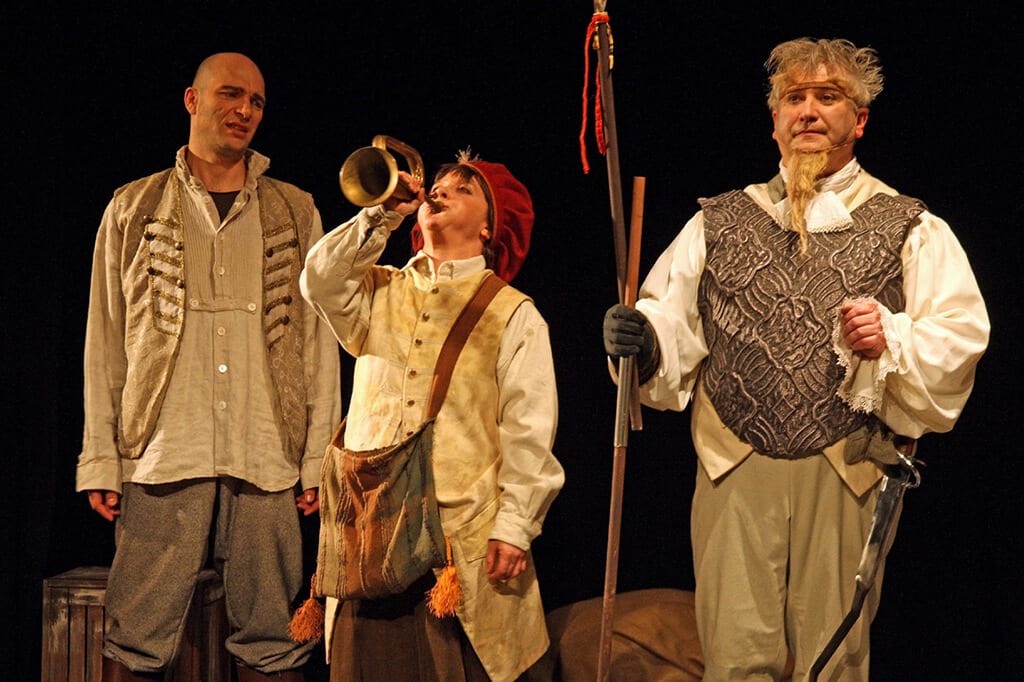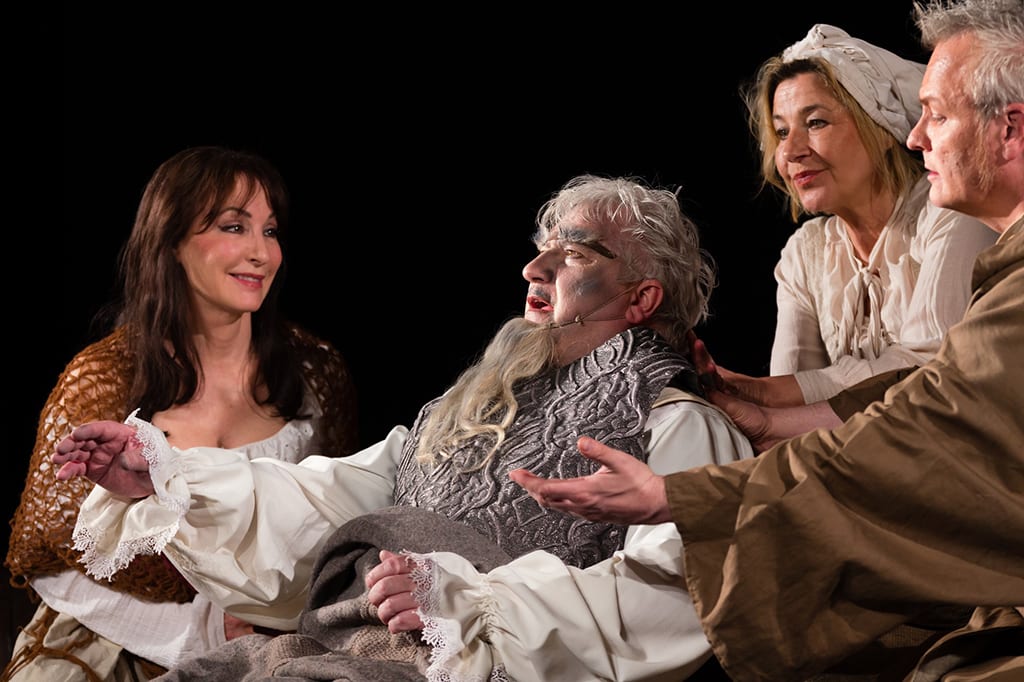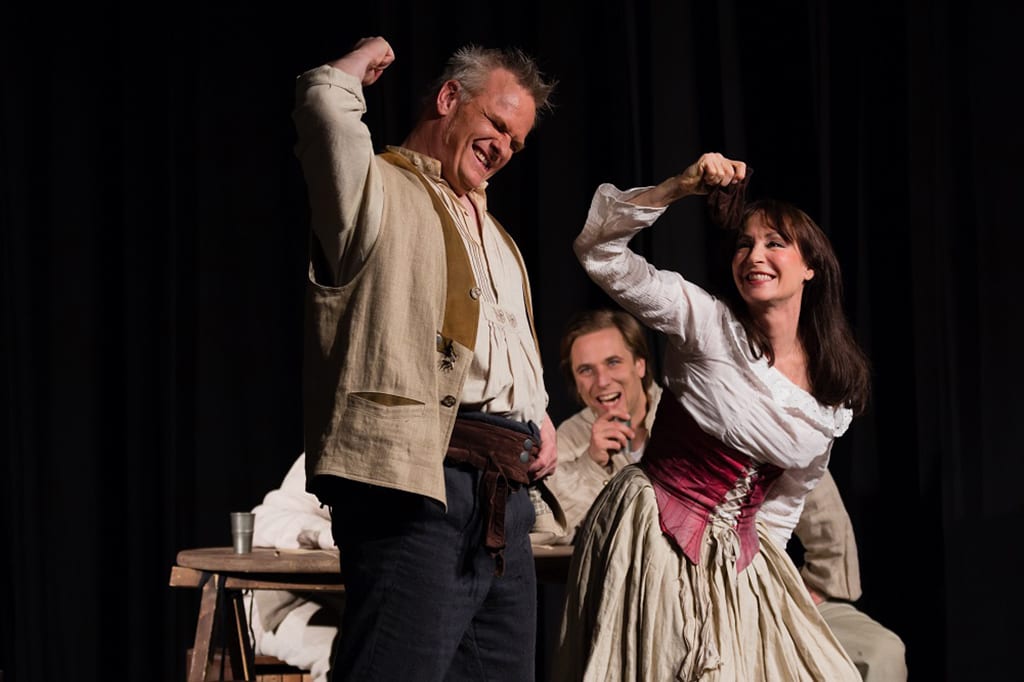He lays down the melancholy burden of sanity and conceives the strangest project ever imagined….to become a knight-errant….
One of the greatest musicals of all time (in my humble opinion), Der Man von La Mancha begins with the echoing clang of a prison cell, as famed author Miguel de Cervantes (Hans-Dieter Maienschein) is locked away with thieves and murderers to await his trial with the Inquisition. While waiting, and to convince the embittered prisoners not to burn his manuscript, Cervantes and his servant weave a story of an elderly man who dreams of being a knight, Don Quixote de La Mancha (Maienschein). Don Quixote and his squire, Sancho (Melina Hepp), traverse the lands tilting at windmills and loving ‘pure but chaste from afar’ a kitchen wench reimagined and renamed Dulcinea (Anna Maria Kaufmann), while his niece Antonia (Anja Stader), her intended Dr. Currasco (Sven Marko Schmidt), and an old friend and priest (Jörg Schäfer) seek him out, hoping to ‘cure’ him of his embarrassing madness.
Papageno Musiktheater’s rendition of this classic musical is, to best sum up, entertaining. Don Quixote is jovial and boisterous, the chorus full of winks and laughter, the female Sancho delightful in a much more grounded, knowing take on the character. Even though the choreography and vocals at times falter, the charm and joy of the production shine through. However, the downside to this comedic, light-hearted take is that the moments of depth, of tragedy and yearning do not hold the same weight as they are given no foundation. Quixote is given no sign of age or wear until his ending, hyperbolic death, Aldonza no sense of helpless rage against her position so her grief filled “Aldonza” is not quite earned, the priest so campy that his late – night disillusioned though hopeful plea for every man to have his own Dulcinea, however false it might be, though beautifully sung, feels a little out of nowhere. The tone is instead pretty consistent, rather than the ups and downs of growing faith and broken despair that can be seen in this play of an aging dreamer and a world of broken men and women. This is not to say that the individual moments and songs of stronger emotions, such as Aldonza’s “What Does He Want of Me” or the haunting, jeering “Little Bird” are not given any weight, but rather that they could have been more affective with proper set up.
Musically, this adaptation holds up. The chorus is the most suited to the traditionally Broadway music, with many of the male characters truly rounding out the harmonies or excelling at their solos. Maienschein, though proficient in the majority of songs, does not quite have the range for the belted sections, fitting perhaps for an aging man, but not doing the music justice nonetheless. And of course, the magnificent Anna Maria Kaufmann is melodious and strong as the broken down yet triumphant Aldonza/Dulcinea. Though the more operatic approach to her vocals sometimes means the annunciation of the words suffers, Kaufmann nonetheless imbues sexuality, grief, confusion, and hope into her take on Aldonza. While Der Man von La Mancha does not have the emotional layering that can be seen in other versions of the production, it is charming, entertaining, and joyful to watch.
Der Mann von La Mancha, eines der größten Musicals aller Zeiten (jedenfalls meiner bescheidenen Meinung zufolge), beginnt mit lautem Getöse aus einer Gefängniszelle: Der berühmte Autor Miguel de Cervantes (Hans-Dieter Maienschein) ist zusammen mit Dieben und Mördern dort eingesperrt und wartet auf seine Inquisition. Während des Wartens und um seine verbitterten Mitgefangenen davon zu überzeugen sein Manuskript nicht zu verbrennen, erfinden Cervantes und sein Diener eine Geschichte von einem betagten Mann, der davon träumt ein Ritter zu sein, Don Quixote de La Mancha (Maienschein). Don Quixote und sein Knappe Sancho (Melina Hepp) ziehen quer durchs Land, kämpfen gegen Windmühlen und lieben das zu Dulcinea umbenannte Dienstmädchen (Anna Maria Kaufmann), während Don Quixotes Nichte (Anja Stader), ihr Verlobter Dr. Currasco (Sven Marko Schmidt) und ein alter Freund und Priester (Jörg Schäfer) ihn ausfindig machen um ihn von seinem Wahnsinn zu “heilen”.



